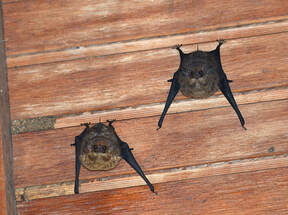 Roosting bats Photo Credit: Asa Wright
Roosting bats Photo Credit: Asa Wright FROM THE FLORIDA FISH AND WILDLIFE COMMISSION'S WEBSITE
If you think bats may be living in your building, now is the time to check your attic, eaves or chimney spaces and take action to exclude them. Bat maternity season begins April 15 and runs through Aug. 15, and during this time it’s illegal to block bats from their roost.
“This is a critical time of year for bats, when they give birth and raise their young,” said Terry Doonan, a Florida Fish and Wildlife Conservation Commission (FWC) biologist and mammal conservation coordinator. “If bats are excluded from a building before their young can fly, they can become trapped inside and die.”
Florida is home to 13 resident bat species, including listed species such as the Florida bonneted bat. Some bat species roost in artificial structures, including buildings and houses. Although it is illegal to harm or kill bats in Florida, rules have been developed stating that legal exclusion of bats has to occur outside of the maternity season. Bats cannot legally be captured or relocated.
Exclusion guidelines on how to remove bats from buildings can be found at MyFWC.com/Bats. Materials and methods to exclude bats can affect the success of that process. For more information on how to conduct a bat exclusion, watch this YouTube video: How to Get Bats Out of a Building. Further details on how to conduct a legal bat exclusion can be found at Bat Conservation International and on the National White-Nose Syndrome Response Team website.
Bats are beneficial to people and are an important part of the ecosystem. The state’s native bats help keep insect populations under control, with the average bat eating hundreds of insects a night. In addition to the benefit of keeping mosquitoes and other insects at bay for residents enjoying the outdoors, the value of insect suppression by bats to U.S. agriculture has been estimated to be in the billions of dollars.
There are several ways that Florida residents and visitors can help bats:
- Preserve natural roost sites, including trees with cavities and peeling bark. Dead fronds left on palms can also provide roosting spots for bats.
- Put up a bat house.
- Report unusual bat behavior to: MyFWC.com/BatMortality.
Bats can carry rabies. Although infected bats may not become aggressive, like any other wild animal, they may bite to defend themselves if handled. Don’t touch or go near any wild animal, especially one that’s not acting normally. For more information about rabies, visit the Florida Department of Health website at FloridaHealth.gov.
If you need assistance, contact your closest FWC Regional Office to speak with a regional wildlife assistance biologist for more information.
For more information on Florida’s bats, go to MyFWC.com/Bats.
 RSS Feed
RSS Feed